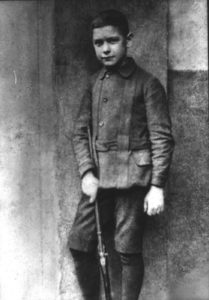The history of the Hungarian workers’ movement after the “II. World War” has been committed to paper almost exclusively by Bolshevik-social democratic Marxists, therefore they regarded all the major manifestations of the class movement as successes of their own party line, while usually they were writing disdainfully about the more radically leftist groups and – beyond leftism – the anti-democratic anarchist-communist groups and phenomena, and called them traitors. But there had been some militants about whom the party-historians had to speak, because, for instance, their activity in the workers’ movement had become inseparable from their literary activity, so it was impossible to remain silent about them.
The press also couldn’t afford not the make capital from a newly discovered proletarian poet or working-class writer for a while. Here we would like to say some words about one of the most controversial figures of the movement in Hungary, Attila József, whom our introduction fits very well. In addition, we can witness now in Hungary a falsification, the aim of which is to make from this proletarian poet a bourgeois poet.
After the crushing of the revolution in 1919, during the twenties, in the Café Blau in Vienna, a small anarchist circle around Erno Weiler met regularly. The latter considered himself a communist, but he had taken a loathing to the Bolshevik “party discipline” and made sabotage acts in Vienna together with his comrades while living the life of the vagabonds. Attila József had traveled to Vienna in order to study, and here he contacted Géza Forgács, a member of the ‘Bund der Herrschaftslosen Sozialisten’ anarchist circle, which published a periodical. The young poet heard a lecture of Pierre Ramus, and there he made acquaintances with Weiler and his comrades. However, their ways separated. In this period Attila József met the Bolshevik elders of the Vienna emigration, György Lukács and Béla Balázs, and they held him a very talented proletarian poet. After the short stay in Vienna, Attila József arrived in Paris in 1926, here he made acquaintances with A. Dauphin-Meunier (who had written his book about the proletarian revolution in Hungary, La Commune Hongroise et les Anarchistes, not long ago, in 1925). Shortly after his arrival, Attila József got in touch with the Anarchist-Communist Union, which was discussing about individualist anarchism versus collectivism and anarcho-communism in this period. There are no memoirs from which we could know whether the young proletarian poet had somehow participated in the debates, and we are also not informed whether he met the Platformists around Makhno. For him, it was more a period of inquiry and immersion than of serious commitment. But the new influences had shown through his revolutionary poems written in those days – it’s enough to mention the excellent Szabados dal (‘Emancipated Song’). Soon he starts to deeply study the works of Marx, and, among others, this helps him to become one of the most brilliant revolutionary poets, the poems of whom step out from the usual medium, penetrate into the factories, workshops and workers’ flats and hardly strike. The poet had become a member of the Bolshevik party, but he was expelled later because of his unreliability and anti-Stalinist views. Marx in lyrics – so we can characterize his most important and best thought-out poetic works. Attila József was one of those few in the Hungarian class movement whose historical materialist approach hadn’t become a peculiar grotesque self-justification which makes one drown in Marxist orthodoxy. His class-struggle poems (he wrote a big number of them while living in the deepest proletarian misery) are tantamount to any high-standard communist analysis, and they are also first-class bases for agitation. Later some of his poems and essays suffered for the fact that the poet hadn’t found his comrades and moved towards social democracy, and with his united frontist views drifted apart from the revolution. His journal contributions and studies are less meaty, but we can see in them the vague picture of a lost serious ‘communist theoretician’ (see A szocializmus bölcselete [‘The Wisdom of Socialism’] from 1934, for example). In 1937, being 32 years old, Attila József committed suicide, not having found his place either in civil life or in the movement, so he decided to let the train destroy his young body which had suffered many privations. We charge also this to the bourgeoisie’s account. Sure it is…
http://shelterofcrime.wordpress.com/2010/06/15/can-we-break-walls-with-dialectics-1/
